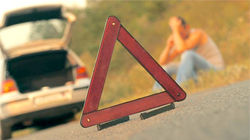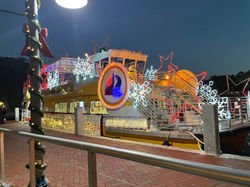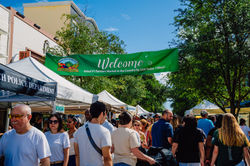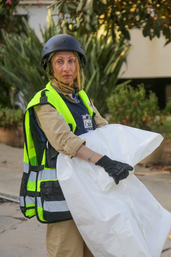“I Remember Every Picture:” One Woman’s Unimaginable Mission After October 7th

Jewish Connection News
Oct 23, 2025
On The Morning Of October 7th, 2023, ZAKA Volunteer Valerie Dyksztejn Was In Beit Shemesh Celebrating Simchat Torah With Her Husband, Daughter, Son-In-Law, And Grandchildren. The Holiday Was Meant For Dancing, Joy, And Rest. Instead, It Became A Day Marked By Unimaginable Horror.
Valerie divides her time between Kyiv, Ukraine, and Israel. That morning, missile sirens woke her and her husband, also a ZAKA volunteer, in Beit Shemesh, a city where rocket warnings are rare. Valerie and her husband, Nachman, immediately responded to Israel’s south, becoming two of the 900 ZAKA volunteers from across Israel who responded during and immediately following Hamas’s attack on October 7th, 2023.
ZAKA volunteers are trained and work alongside Israel’s law enforcement, security and rescue establishments to ensure dignity for the dead in times of tragedy. The organization that was founded to honor the dead in accordance with religious tradition, has evolved into a full-scale emergency response network operating around the clock. In total, more than 4,000 trained ZAKA volunteers serve the Jewish, Bedouin, Arab, and Druze communities across Israel with teams ranging from rapid medical response to urban search and rescue, water recovery, and culturally sensitive burial services.
Still wearing her holiday clothes, Valerie joined her husband in their car and headed south to respond. Their first stop was Barzilai Hospital in Ashkelon, where ZAKA volunteers were processing the bodies of the dead as they arrived. Soon after, they were directed to join a ZAKA Ambulance heading towards the site of the Nova music festival, where reports began to emerge of a massacre.
As the ambulance drove down Route 34, they encountered scattered bodies. The team stopped the ambulance to begin the painful task of providing dignity to the dead, placing the bodies in bags so they could be transported, identified, and buried with dignity as soon as possible while also clearing the roadway for emergency vehicles heading south. The number of bodies was so large that they could not fit into their ambulance, so the group laid the body bags at the side of the road and communicated with ZAKA’s command center to direct trucks that were enroute to collect them.
Valerie helped by opening bags one by one, working quickly to ease the burden for others. Behind each body, she said, was a world: someone’s child, parent, sibling.
As they approached the Nova festival site, the road grew more chaotic. Burned cars lined the sides, gunfire echoed in the distance, and the smell of death was heavy in the air. The scene was beyond anything Valerie had imagined, even after spending the previous year and a half helping evacuate wounded civilians and Holocaust survivors from war-torn Ukraine.
At the festival grounds, she saw Israeli soldiers, many barely out of their teens, frozen in place and paralyzed by the scale of death surrounding them. Valerie worked without pause, opening bag after bag while her husband and other ZAKA volunteers did everything possible to bring dignity to hundreds of murdered young people. By morning, they had run out of bags.
Valerie thought the worst was over. Then they were sent to homes in the kibbutzim near the Gaza border – an area Valerie knew well after growing up there. The devastation was even more personal. Families had been tortured and executed. Children were burned alive. Women were mutilated and left exposed. She said words could never convey what they saw. In one shelter, bodies were piled on top of each other, faces twisted in fear and pain. There was no longer a need for imagination, only the stark reality of human cruelty.
The suffering became unbearable for Valerie, who, at the suggestion of her husband, began taking photographs to help in the identification process including tattoos, rings, or any other remarkable features.
At first, she did it to help in the identification process. Later, she realized that no one else was doing it. Police and military forces were overwhelmed, focusing on clearing the area of terrorists. Someone had to preserve the truth.
Weeks later, Valerie traveled with her husband and a lawyer to Geneva to present their testimony, photos and video to the United Nations. There, disbelief turned to despair. UN officials questioned how she could know a body belonged to a child, suggesting perhaps it was just a small adult. Valerie was stunned. For her, that moment marked a second violation - the first committed by Hamas, the second by the world’s refusal to believe what had happened.
Two years later, Valerie, who has returned to her profession running an artisanal natural hair and beauty brand, remembers every picture and every moment, but refuses to live inside them. “I will never forget,” she said. “But I try not to sleep with it. I try not to live with it every day.”
She is deeply disturbed by how quickly the world moved on. The silence that followed October 7th was, in her view, its own kind of attack. What happened that day, she said, should have shaken every moral institution on earth. Instead, the world looked away.
For Valerie Dykstejn, ZAKA’s mission did not end after the bodies were buried. It lives on in the memory of those lost, through her refusal to be silent, and through her belief that to honor the dead is also to fight for the living.
“We did not go to save lives,” she said. “We went to give those who died back their names and their dignity.”
Founded to honor the dead in accordance with religious tradition, ZAKA has evolved into a full-scale emergency response network, with over 4,000 trained volunteers operating 24/7 across Israel to honor the dead, aid the living and bring dignity in times of devastation. Today, it operates a wide range of units – from rapid medical response and urban search and rescue to water recovery and culturally sensitive burial teams serving Israel’s Jewish, Bedouin, Arab, and Druze communities. For more information, visit: https://zakaworld.org/.












































































